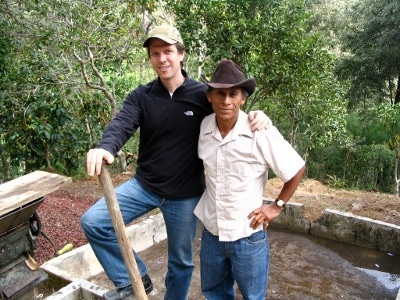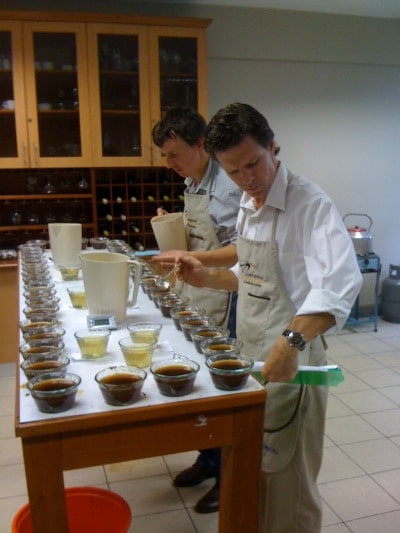
Once again we return to our So You Want My Job series, in which we interview men who are employed in desirable jobs and ask them about the reality of their work and for advice on how men can live their dream.
Behind every great cup of joe, is a great green coffee buyer like Mark Inman. Mr. Inman works for Taylor Maid Farms, a company that supports small family farmers and promotes organic, sustainable agriculture. Mr. Inman travels the world dealing with coffee at its source and ensuring that every cup of his java is top notch. Mark has spent two decades in the coffee business and today shares a fascinating look into a job that combines adventure and beans.
1. Tell us a little about yourself (Where are you from? How old are you? Describe your job and how long you’ve been at it, ect).
I live in Sebastopol, California- right in the middle of the Sonoma wine country. I am 41 years old and have worked in the specialty coffee business for 20 years.
A green coffee buyer (“green coffee” refers to raw or unroasted coffee) is a person who is trained in the sourcing of coffee from origin countries, evaluating/grading coffee, setting a price for coffee, understanding the commodity of coffee, creating blends or setting specs for coffee roasting profiles.
Annually, a green coffee buyer can spend months in countries working with individual coffee growers, grower groups or export companies. At my company, Taylor Maid Farms, I work with growers and grower groups in 19 different countries and am away from home up to 4 months a year.
2. Why did you want to become a coffee buyer? When did you know it was what you wanted to do?
Like many in this trade, I fell into this career by accident. I was finishing college studying Oenlogly/Viticulture when I learned about tasting coffee professionally. I learned that coffee and wine grapes are very similar in the amount of varieties available, the various microclimates that are advantageous for each variety, the lifespan of the plant (“Old Vine†exists in both coffee and wine), and how each product is processed to create a dynamically tasting beverage.
Like the infamous U.C. Davis wine wheel, the professional coffee tasters wheel has a similar number of detectable aromatic and flavor compounds. At the time I started in this career, I had no idea that coffee could be as complex as wine but as I started down the path of this industry I found that my formal education in wine/agriculture gave me an early advantage in the coffee boom of the early 90’s.
3. How does a man learn the coffee business? While it would certainly be popular, you currently can’t major in coffee at college.
Like many trades, most learn this by apprenticing. Currently the educational opportunities outside of direct apprenticing are limited. The Specialty Coffee Association of America (SCAA.Org) is one group that offers courses to learn about Roasting, Green Coffee Grading/Buying, and coffee preparation (Barista).

4. How do you go from being a coffee enthusiast to being paid for what you do? How do you break into the coffee business?
I did not even drink coffee when I fell into the business. I did, though learn early on in the specialty coffee boom how unregulated and dangerous the use of agrichemicals in coffee growing regions was and was able to position myself very well early on as an expert in organic agriculture (using my training from the wine industry). I spent the early part of my career assisting farmers in converting their farms to gain organic certification and helped them find buyers willing to pay higher prices for higher quality coffee. I also became interested early on in heirloom or old world varieties of coffee like Borubon and Typica which are highly desirable today and began collecting rare seeds to preserve these rapidly disappearing varieties.
One of the other things that struck me early on was how well green coffee buyers could get paid. When I was studying wine, consolidation was happening and the odds of getting a good wage as a head winemaker were getting more difficult. Salaries in this field can range from $50,000/year to $300,000+!
5. How competitive is it to get hired as a coffee buyer? I imagine there are not many positions available and a lot of coffee enthusiasts who want the position. What sets a successful candidate apart from the rest?
It is very competitive to get hired as a green coffee buyer. As people advance in the trade, they ultimately want to either work towards being a green coffee buyer or a Green Coffee Importer, which has you on the road a lot. Most people think the travel is exotic or luxurious and can become quickly disappointed when they find themselves sleeping in a lot of dirt-floored houses in the back hills of a developing country and constantly wrestling with some type of malady.
Today, those who desire to be a serious candidate for this position should be able to speak Spanish fluently, have a well trained palate or have a knack for finding depth and flavor in everything they drink or eat, be able to write well and be comfortable with being a public speaker. You should not be fearful of traveling in dangerous parts of the world and have a certain comfort level with rough travel as you will spend countless hours in a chicken bus, on the back of a truck, in a canoe or on a horse, camel or donkey.
6. What is the best part of your job?
Too many to count, really. I have seen some of the most amazing places, cultures, people, and tragedies in my 20 years in this field. I have been a technician on numerous USAID and ACDI/VOCA projects that have helped transform communities in the developing world. I have served both on the board of Directors and been the President of the largest coffee trade association in the world, the Specialty Coffee Association of America (SCAA), have written articles on numerous issues in the coffee industry for numerous magazines and have assisted dozens of people in launching their own cafés, small roasteries and coffee wholesale business….But the best part, by far, is working with the people who have dedicated their lives to produce a wonderfully interesting beverage that most people wake up with each day, but often take for granted.
7. What is the worst part of your job?
Being away from my son when I travel, I have been fortunate to have the opportunity to bring him with me on many of my trips (he is 6), but when I am away from him for any real length of time, it is torture.
8. What’s the work/family/life balance like?
It’s the toughest part of the job. With the numerous months in other countries, many green coffee buyers watch their marriages dissolve right before their eyes. While I thought I could avoid that common issue, I too found myself becoming one of the casualties of this phenomenon, even though my former wife worked in this industry. I have, though, made my child my highest priority and will not miss his growing up in pursuit of great coffee. Others, though, have made that sacrifice and lived to regret it.
9. What is the biggest misconception people have about your job?
That I am going down to purchase burlap bags of roasted coffee beans like in the Yuban commercial.
10. Any other advice, tips, or anecdotes you’d like to share?
Get accustomed to contracting diseases that you’ve probably never heard of before. Aside from Malaria and Yellow Fever, you will eventually be a host to numerous varieties of parasites, learn why they call Dengue Fever “Bone Break†disease and spend more international flights in the bathroom than your seat!
Tags: So You Want My Job

